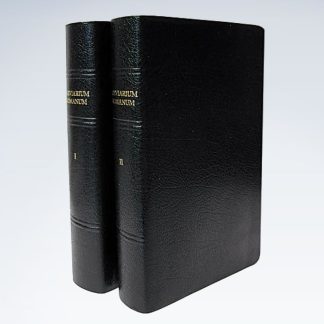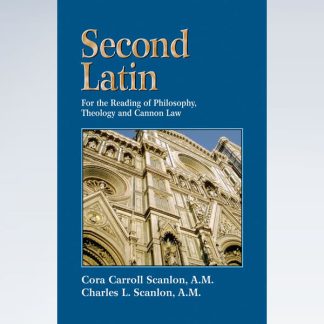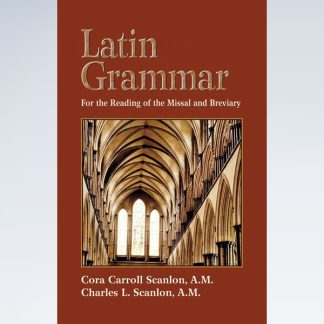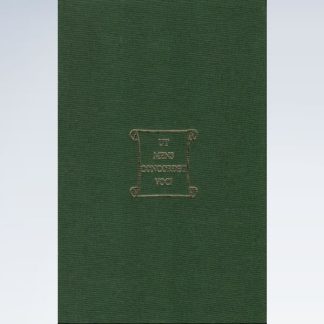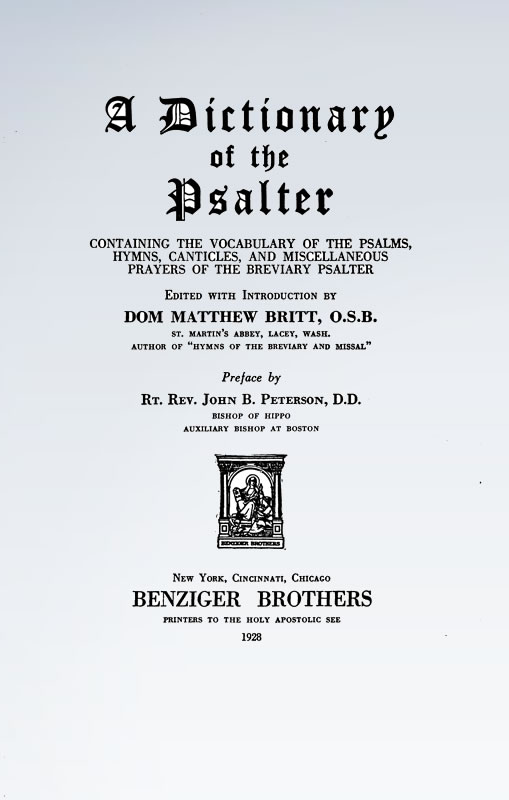
The a modern efficiency expert to measure the energy daily spent in the world-wide recitation of the Breviary his findings would be overwhelming. Unceasingly, with the ceaseless course of the sun, successive choirs of religious men and women chant the passing hours in a chorus of praise and prayer that is never silenced; while all through the day throughout the entire world countless other lips whisper the selfsame song. Everyone of the unnumbered legion in Sacred Orders, of every race and nation, whether in centers of civilization or in lonesome missionary fields, turns at times each day from the toil and cares of his ministry and, in comforting communion with God, unites his solitary voice with capitular and monastic choirs in the universal melody of the Divine Office. The quantity of energy, physical, mental and spiritual, consumed in this unending service is incalculable.
Were one to venture further and try to measure the results of this common effort his task would be hopeless. Its Godward influence is of course beyond finite calculation. Let the very thought be reverently dismissed: yet not without passing recognition of the undoubtedly stupendous effects of the Divine Office on the destinies of the Church and of mankind. Its daily recitation for centuries by so many devoted souls could not but effect the world’s history and dispose untold events for God’s greater glory and the salvation of numberless souls.
But there are produced as well effects that are quite personal. Even apart from the efficacy of prayers of petition there are influences quietly wrought in the mind and heart and soul of anyone devoted to the Church’s constant prayer. Pope Pius X suggested some in his constitution Divino afflatu, in which without doubt the editor of this book found the inspiration of his fruitful labors. The saintly Pontiff wrote: “Who will not be moved by the frequent passages of the Psalms in which the infinite majesty of God, His omnipotence, His unspeakable justice or goodness or mercy, or His other infinite praises are so nobly proclaimed? Who will not be inspired with similar feelings by their thanksgiving for benefits received from God, or by their humble and trustful prayers for desired favors, or by those outcries of the penitent soul at the sight of his sins? Whom will the Psalmist not fill with admiration when he recounts God’s benign gifts to the people of Israel and to all mankind, and when he sets forth the truths of heavenly wisdom? Who, finally, will not be inflamed with love for the carefully foreshadowed figure of Christ our Redeemer, whose voice St. Augustine heard ‘in all the Psalms, either singing or sighing, or rejoicing in hope, or mourning in present sorrow’?“
With no exaggeration may it be said that if one were to realize in himself effects commensurate with the effort which the Divine Office demands, were one but to receive the normal return for so much time well spent, one would gradually become by fidelity to this daily duty a Christian of singular holiness and vigor.
Such a change, however, would be proportioned to one’s recitation of the Office as the Church’s tradition would have it: “digne, attente, devote.” The devotional and all-important element, to which the other two are ancillary, depends upon one’s constant exercise of the theological and religious virtues. The worthy recitation of the Office is provided by bodily composure in decent surroundings conducive to peace in the old-time religious sense of that word.
But the third element, even though only contributory, has an importance that cannot be overestimated. Only an attentive reading can be really devotional and worthy; and attention depends very much upon an understanding of what one reads. St. Augustine expressed it succinctly when he wrote: “When you pray to God in psalms and hymns let the heart feel what the voice utters.” St. Benedict summed it up in his saying: “ut mens nostra concordet voci nostrae.“
St. Charles Borromeo, in a sermon to his priests, quoted by Pope Pius X in his golden jubilee exhortation to the clergy, wrote on a text from the one hundredth Psalm: “psallam, et intelligam,’ if you recite the Psalms, meditate to whom it is you speak and what it is you say.”
Therefore, without in the least depreciating the generous and fruitful efforts of those who, without the Latin training of the priest, chant the inspired praises of God in a tongue not entirely familiar but from hearts most pleasing to God, it may be said that the better one understands the meaning of the psalter the easier it becomes to pray and the more helpful become one’s prayers. Anything, then, that can help the present or prospective celebrant of the Divine Office the more intelligently to perform this daily service becomes of inestimable value.
Such surely is the volume here presented. Earnestly is it to be hoped that its extensive use will bring to individual souls as well as to the Church and to humanity a richer return for the energy generously spent each day in choral or personal psalmody, which one may at times fail fully to realize because of incomplete familiarity with the richly pregnant letter of one’s daily prayer.
Moreover, the Priest at least, among the many who daily use the Latin Psalter, is the guardian of the Latin language and of the culture to which the classics lend enduring vigor. Latin is the official language of his Church. Latin is the language of all his prayers at the altar and in choir. Latin is the lasting matrix in which is graven ineffaceably the doctrine which he believes and teaches. Latin may be called the sacerdotal tongue. As a sacred trust it is committed to the keeping of the priest; and he is false to that trust who does not make due effort to cultivate the priestly language. With a dictionary such as this at hand the Latin of his Breviary will take on a clearer meaning; and the reader must needs become a better Latinist. It were to be desired that during the seminary course every student would with its aid explore profoundly the riches of the Latin
Vulgate Psalter, and make its words and thoughts so much his own that he will the more readily think in Latin. Indeed, in preparatory seminaries and in novitiates of both male and female Religious, where the neophyte is introduced to ecclesiastical chant and liturgical offices, one should begin to thumb the pages of this book and so at once make more vital the lessons of the Latin classroom and more soul-stirring the sublime poetry of the Psalms.
Then, too, a fuller understanding of the Latin Psalms and a deeper penetration of their treasures, becoming by dint of constant repetition a part of one’s mental and spiritual being, will make it natural and easy to draw upon their riches in the pulpit. The preacher could more readily weave their form and substance into his discourses. The “sweet book of Psalms,” as St. Ambrose called it, would lend savor and strength to his lessons and pleading. Our pulpits would thus more often make the appeal that must come from greater use of inspired language to which every soul seems instinctively attuned, ever ready to recognize and hearken to the Voice which brought it into being and to which it is destined to listen for all eternity.
Dom Britt for these and other reasons has done a deservedly welcome service to the Church and to the clergy. His labors will help the priest to pray and to preach. They will light the way of the student of the Sacred Scriptures and of the Latin language. They will aid the aspiring soul to anticipate more clearly the desired vision of God. And he has done this work in a scholarly fashion. Rich scholarship is evidenced in the Introduction; and a nice discernment distinguishes the ample vocabulary. The fruits of this scholarship are mature, ripened by long and actual experiment in a Benedictine novitiate.
In bringing to creditable completion this helpful work, the editor has lived up to the traditions of his venerable Order. Devotion to the Divine Office, the “Opus Dei,” and to the preservation of the classics for Christian culture, have characterized the sons of St. Benedict during two thirds of the Christian era. Everyone who profits by his fruitful labors will owe to Dom Britt no trifling share of the tribute which ages have been paying to Benedictine zeal and culture.
Source: A Dictionary of the Psalter. 1928 Edition
JOHN B. PETERSON
Bishop of Hippo
Auxiliary Bishop at Boston

-
Divine Office (In Latin and English)US$ 49.00
-
Douay-Rheims & Clementina Vulgata Bible in Latin and English (side-by-side)US$ 124.00
-
Roman Breviary (2 Volume Set: includes USA Propers and 4-card Breviary Insert set)US$ 299.00
-
Second Latin: Preparation for the Reading of Philosophy, Theology and Canon LawUS$ 25.00
-
Latin Grammar: Preparation for the Reading of the Missal and BreviaryUS$ 25.00
-
A Dictionary of the PsalterUS$ 42.00
VIRGÓ SACRÁTA is a Christian mission-driven online resource and shop inspired from the beauty of Catholic faith, tradition, and arts. Our mission is to “Restore All Things to Christ!”, in continuing the legacy of Pope St. Pius X under the patronage of the Blessed Virgin Mary. “Who is she that cometh forth as the morning rising, fair as the moon, bright as the sun, terrible as an army set in battle array?” O Mary, conceived without sin, pray for us who have recourse to Thee.



